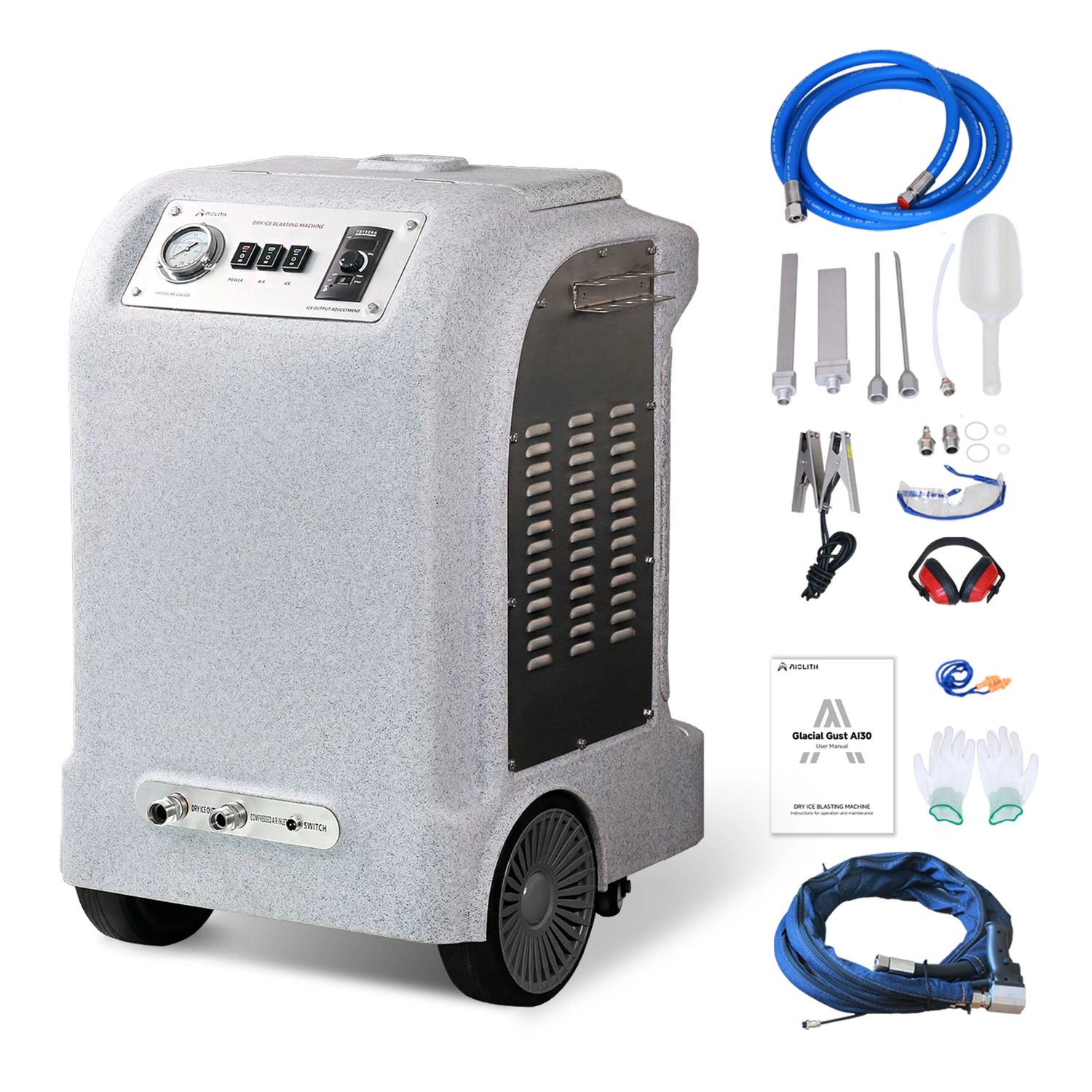The Ultimate Guide to Industrial Floor Cleaner: Keeping Your Floors Spotless
Share
Your Complete Guide to Choosing the Best Industrial Floor Cleaner
When you think of a clean workspace, the floor might not be the first thing that pops into your mind. But the condition of your industrial floors says a lot about your business. From safety to first impressions, an industrial floor cleaner plays a huge role in maintaining a professional and safe environment.
Whether you're managing a warehouse, factory, or large retail space, using the right cleaner for your industrial floors is essential. But what exactly is an industrial floor cleaner? Why should you care? And how do you choose the right one? Stick with me, and I'll walk you through everything you need to know.
What is an Industrial Floor Cleaner?
An industrial floor cleaner is a heavy-duty cleaning machine designed to clean large commercial and industrial floors efficiently. Unlike household cleaning tools, these machines are built to handle tough dirt, grease, and grime on surfaces like concrete, tiles, and epoxy coatings in warehouses, factories, and big retail spaces.
Think of it like the difference between washing your car by hand and using an automatic car wash machine — both get the job done, but one is much faster and more powerful. Industrial floor cleaning machines range from ride-on scrubbers and automatic sweepers to walk-behind scrubbers and scrubber-dryers, all made to save time and deliver a deep, consistent clean.
Why is Regular Floor Cleaning So Important?
Ever walked into a dirty factory or warehouse? It doesn’t leave a great impression. Clean floors are about more than just appearances:
- Safety: Slips, trips, and falls often happen due to greasy or wet floors. Clean floors reduce these risks significantly.
- Durability: Dirt, grit, and debris can wear down floor surfaces over time, leading to expensive repairs or replacements.
- Hygiene: For food processing, pharmaceutical, or healthcare industries, cleanliness is critical to meet strict health and safety regulations.
- Productivity: Studies show that employees feel better, are more motivated, and work more efficiently in clean, well-maintained environments.
Understanding Your Cleaning Challenges
Before choosing a cleaner, you need to know what you're up against. This breaks down into two key areas: the type of floor you have and the type of dirt you need to remove.
Different Types of Industrial Floors
- Concrete Floors: The most common industrial floor. It's tough but porous and can trap dirt easily.
- Epoxy Floors: Coated floors that are smooth, durable, and resistant to chemicals.
- Tile Floors: Often used in commercial kitchens or labs; they can be ceramic or porcelain and have grout lines that trap grime.
- Vinyl Floors: Common in cleanrooms, medical areas, or retail spaces.
- Wood Floors: Rare in heavy industrial spaces but still found in some older warehouses or specialty venues.
Common Dirt and Stains to Tackle
- Grease and Oil: Common from machinery, forklifts, and other vehicles.
- Dust and Debris: From raw materials, production processes, or packaging.
- Chemical Spills: Can be harsh, corrosive, and require specific cleaning protocols.
- Tire Marks: Left by forklifts and other indoor vehicles.
- Food and Beverage Spills: Prevalent in production facilities or employee cafeteria areas.
Types of Industrial Floor Cleaner Machines
When it comes to industrial floor cleaners, we’re talking about powerful machines designed to make cleaning large areas easier. Here’s a breakdown of the most common types:
- Walk-Behind Scrubbers: Compact machines pushed by an operator. Perfect for small to medium-sized areas and maneuverable around obstacles.
- Ride-On Scrubbers: Larger machines where the operator rides on top, ideal for very large spaces like distribution centers and factories. They cover more ground faster and reduce operator fatigue.
- Automatic Sweepers: Designed to pick up dry dust, debris, and dirt quickly, usually the first step before scrubbing.
- Scrubber-Dryers: Scrub the floor with a cleaning solution and then vacuum it dry in a single pass, leaving floors clean and safe immediately.
- Battery-Powered vs. Corded: Battery-powered machines offer mobility without cords, while corded models provide continuous power for long sessions.
How to Choose the Right Industrial Floor Cleaner
- Floor Type: What type of floor do I have? Determines brush or pad needed.
- Area Size: How large is the area? Helps decide between walk-behind or ride-on model.
- Dirt Type: What kind of dirt or stains? Oily grime requires stronger brush pressure and degreasing solutions.
- Obstacles: Layout open or cluttered? Maneuverability is key.
- Power Source: Do I need battery-powered freedom or is corded power sufficient?
Safe Operation and Maintenance
Safety Tips for Using Cleaning Equipment
- Read the manual carefully before operating any machine.
- Wear gloves, safety glasses, and non-slip footwear.
- Ensure good ventilation when using strong cleaning solutions.
- Inspect the machine for damage, especially electrical cords.
- Use "Wet Floor" signs to prevent slips.
- Train operators properly to avoid injury and poor results.
Common Mistakes to Avoid
- Using the wrong brush/pad that could damage the floor.
- Ignoring regular maintenance like cleaning tanks or checking squeegees.
- Skipping pre-sweep; scrubbing debris-covered floors can damage the machine.
- Using too much solution, leaving residue and increasing drying time.
Developing Your Cleaning Strategy
How Often Should You Clean Industrial Floors?
- Industry Type: Food and beverage require more frequent cleaning than storage warehouses.
- Traffic Levels: High foot/vehicle traffic areas need daily attention.
- Regulatory Requirements: Some industries mandate cleaning schedules for compliance.
DIY vs. Professional Cleaning Services
A hybrid approach often works best: daily in-house cleaning with periodic professional deep cleans.
Maintenance Tips for Long-Lasting Floors
- Use quality mats at entrances to trap dirt.
- Address spills immediately.
- Inspect floors for cracks/damage and repair promptly.
- Sweep or dust mop daily.
The Business Case for a Quality Cleaner
The Cost Factor: Is It Worth It?
- Fewer slip-and-fall accidents and liability claims.
- Longer floor lifespan, delaying repairs/replacements.
- Improved employee morale and productivity.
- Compliance with health and safety standards.
Eco-Friendly Industrial Floor Cleaners
Eco-friendly machines reduce environmental impact using less water, energy-efficient motors, and biodegradable cleaning agents, lowering utility bills and supporting green initiatives.
Latest Trends in Industrial Floor Cleaning
- Robotic Floor Cleaners: Autonomous machines that automate repetitive cleaning tasks.
- Water-Saving Technology: Recycles and reduces water use during scrubbing.
- Data-Driven Cleaning: Sensors and software optimize cleaning schedules and machine performance.
Conclusion and Final Thoughts
Choosing the right industrial floor cleaner is a critical investment in safety, appearance, and productivity. By understanding floor types, soils, and available machines, you can select a cleaner tailored to your needs. Maintain your floors consistently, follow safety protocols, and your workspace will shine.
Frequently Asked Questions (FAQs)
1. What makes an industrial floor cleaning machine different from a regular floor cleaner?
Industrial machines are larger, more powerful, and built for heavy-duty cleaning on large surfaces.
2. Can eco-friendly industrial floor cleaning machines work on all floor types?
Most are versatile, but always check specifications and settings for compatibility.
3. How often should industrial floors be cleaned using these machines?
Frequency depends on industry and traffic — some daily, others weekly or monthly.
4. Is professional machine-operated floor cleaning necessary for industrial spaces?
Professional services offer expertise and specialized equipment, especially for tough or sensitive floor types.
5. Are industrial floor cleaning machines safe for operators?
When used properly with training and protective gear, they are safe. Follow manufacturer safety guidelines.

